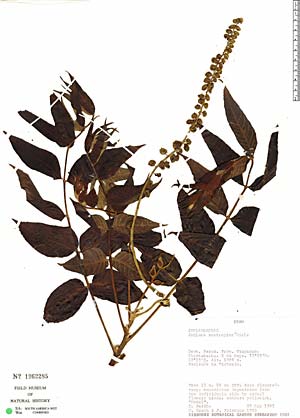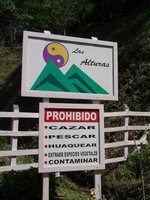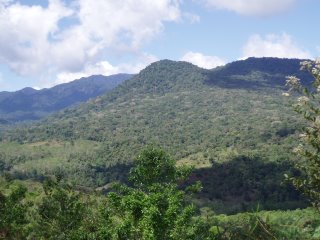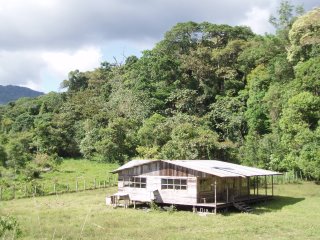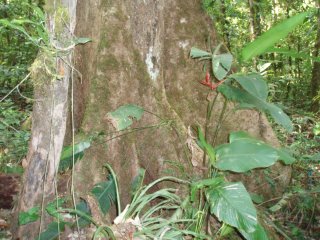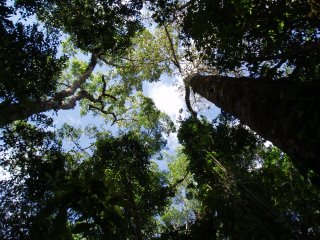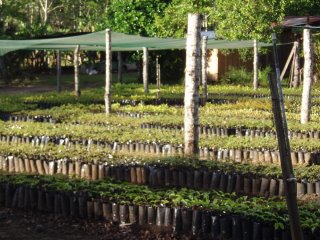by Eliot Logan-Hines
Alot of consumers in the United States are becoming familiar with "Fair Trade", hoping to bring about a change in the treatment and payment to workers and farmers in "Third World" countries, by cutting out middlemen and establishing standards and regulations. "Fair Trade" is not an international standard, therfore to be certified in England requires a different beaurocracy than being certified in the US. This is taken from FairTradeUSA´s website, http://www.transfairusa.org/:

The principal criteria of Fair Trade certification are:
-Fair prices for farmers and decent working and living conditions for workers
-Direct trade with farmers, bypassing middlemen
-Free association of workers and co-ops, with structures for democratic decision-making
-Access to capital
-Sustainable agricultural practices including restricted use of agrochemicals
I want to give a brief overview of my visit to a certified "Organic-Fair Trade" coffee farm and cooperative in Nicaragua, and an explination for my disillusionment with any idea of "fairness".
I visited a coffee growing community in the mountains above Matagalpa, Nicaragua. The "cooperative" that processes and markets the coffee of these group of farmers is called Cecocaphen RL. It is not "fair" to look at this organization and current state of business without knowledge of the last 30 years of Nicaraguan history (or, really, 500) Please read my blog, A brief history of Nicaragua, to get a slight picture of the current problem.
Coming from a coffee-growing community in Costa Rica, with two of its natives, we all couldn't believe how poor these Nicaraguan farmers were in comparison. All of the houses have dirt floors. The village is wired with electricity but there are frequent black outs and brown outs. There is no tap water, only well water that needs to be filtered. The bathrooms were only outhouses, no porcelin thrones like Nicaragua´s "Rica" neighbor. No one owns a car or motorcycle, hardly any have bikes. But amid all this poverty, they grow "Organic Fair Trade" coffee.
Whereas in Aguabuena, where high pressured tap water poors out of (relatively) hot showers, and teenagers ride their dirt bikes up and down the main street every night complaining of boredom, only to go home and watch dvds and listen to reagetón on their big sound systems, in this now seemingly rich town in the country, Aguabuena, the farmers are "too poor" to be certified Organic ni Fair Trade.
 A typical house in La Corona, Nicaragua.
A typical house in La Corona, Nicaragua. The two Costa Rican natives, Julietta and Walter, on the streets of Matagalpa.
The two Costa Rican natives, Julietta and Walter, on the streets of Matagalpa.¿What is going on?
Cecocaphen (Matagalpa, Nicaragua) vs Coope Publos (Aguabuena, Costa Rica)
Cecocaphen is a second (or maybe third) level cooperative. I dont know how many middlemen end up being between the producer and the consumer (there were still too many to count). It pools coffee from the entire northern area of Nicaragua, comprised of thousands of small-scale farmers. Each of these smaller communities forms a smaller cooperative, that pools together to another regional cooperative, that then pools to the large Sol Cafe processing plant. The coffee is marketed by Cecocaphen to US and European importers. The coffee is shipped by boat from one of Nicaragua´s two ports as green beans. The office of Cecocaphen is a very pretty building up on a hill overlooking the city of Matagalpa. They have air conditioning, a full pot of coffee in the waiting room, skylights, and beautiful gardens.
Coope Pueblos, in our town of Aguabuena, Costa Rica is a small cooperative. There are about fifty coffee farmers that are members of this cooperative and pool their coffee together. It is then processed and roasted in a neighboring community, by a neighboring cooperative (I will write a history of the tragedies that have befallen these cooperative later). It is then marketed by a non-profit (CAN) based out of Santa Cruz, CA, and shipped straight to the doorstep of the consumer in the US or Canada. The office of Coope Pueblos is a modest building with its share of problems. The office is currently also an internet café and is in the process of being certified to sell coffee and espresso drinks.
It is hard to really know which farmers gets paid better. Being Fair-Trade, Organic certified, the Nicaraguan farmers should receive $1.41/lb ($US, everything is in US$). That is the going rate, even Starbucks´. In Aguabuena, farmers sell 100 pounds for $100. So it seems like the Nicaraguan´s got the better deal, but wait. The Costa Ricans (by Costa Rica, I only mean farmers of Coope Pueblos) sell theirs as whole berries with the red skin and everything. The Nicaraguans (and by this, I mean Cecocaphenés) do the first stage of processing the coffee, removing the berries skin, at home. This requires more work and more labor. These "mini beneficios" are found in almost every farmer´s farm. They then dry the beans, thus loosing water and weight to sell them for $1.41. So, I dont know which farmer´s get a better deal. But I can tell you that the Nicaraguans have dirt floors.
But then again, this isn´t Cecocaphen´s fault. The government of Nicaragua is beyond broke. The current ex president is under house arrest for embezzling the entire countries GDP and international aide, while running the country out of his luxurious home; not to mention, the history of economic manipulations by Uncle Sam. A cooperative like Coope Pueblos could never exist in Nicaragua. The Costa Rican government gives major economic help to "Cooperatives". Cooperatives can qualify for low interest loans and tax breaks, but in Nicaragua, nothing. So what does it mean to be a Cooperative in Nicaragua?
They have a democratic structure. Each mini cooperative has an elected representative that sits on the board of the regional cooperative which has an elected representative that sits on the board of Cecocaphen. In Nicaragua, to survive at all as a business you have to sell out to the big guys. You can´t function as a little town cooperative, you have to have play the major leagues. The image I will never forget after touring the processing plant, was coming back to the main office where we were given a lesson on aromas and flavors by the official taster/quality control of Cecocaphen. He was a little man with a moustache who slurped the coffee very loudly, swished it around in his mouth, wrinkled his nose, and spit it out in the trash can. He spoke of the hints of movie-theater-popcorn-butter and apricots. All I could think was that the women working the assembly line probably had no idea what either of those two things smelled like.
 Tasting with Cecocaphen. Josh Mills with the dirty tee shirt is tasting coffee, the taster is in the background with his apron and moustache, Alfredo, a young coffee farmer, is in the foreground.
Tasting with Cecocaphen. Josh Mills with the dirty tee shirt is tasting coffee, the taster is in the background with his apron and moustache, Alfredo, a young coffee farmer, is in the foreground. These women are sorting through coffee beans as part of Cecocaphen´s high quality standards. There are seventy women in this room. They work 8 hours a day with a 1 hour break. They get paid $3/day. This is Fair Trade.
These women are sorting through coffee beans as part of Cecocaphen´s high quality standards. There are seventy women in this room. They work 8 hours a day with a 1 hour break. They get paid $3/day. This is Fair Trade. And then we come back to Aguabuena, a now seemingly small and middle-class cooperative, where Walter ships out each weeks shipment of coffee. There are only a few people that work at the processing plant. Everyone here has free time to talk, even the coffee roaster while he is roasting up the French Roast. He jokes that only Estadounidenses like French Roast. The cooperative here doesnt have enough money to buy its fair trade certification. Most of the cooperatives here only sell within Costa Rica so there seems to be no rush. CAN is trying to help, maybe in time.
I don´t know whats fair. Cecocaphen doesn´t seem fair. But then again, I have no idea what the conditions are like in Vietnam and Brasil where the cheapest coffee is produced. Maybe this is fair. I don´t want to turn people away from Fair Trade. I think it is an important step. Maybe more important than anything is the change in the awareness of the consumer. We need to know what we are buying and where our $$ goes. But, if you want my opinion, I think you should buy from here, Coope Pueblos. I see the coffee get shipped out each week to each individual consumer. I know the people packing it. It feels like the fairest of the options.
If you want to order coffee from Coope Pueblos, go to http://www.communityagroecology.net/cart/

